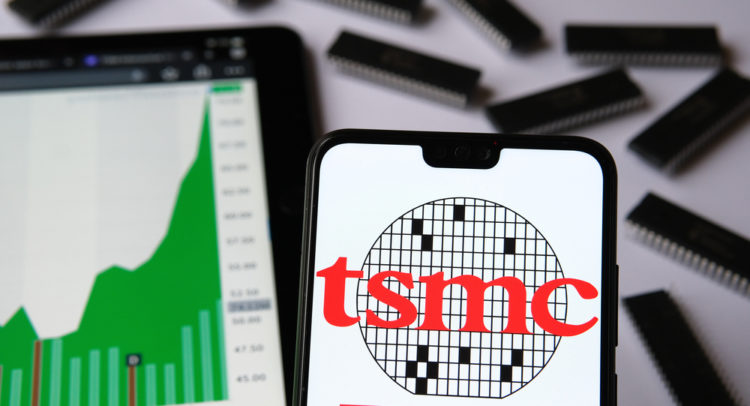Rising Chip Demand
Invest with Confidence:
- Follow TipRanks' Top Wall Street Analysts to uncover their success rate and average return.
- Join thousands of data-driven investors – Build your Smart Portfolio for personalized insights.
Amid a global chip shortage, Taiwan Semiconductor Manufacturing (TSM) is working to increase its manufacturing capacity and to cater to the rising demand. The semiconductor company elaborated on its plans during its fiscal 1Q earnings call.
TSM believes that a combination of factors including the increase in the number of people working from home due to the pandemic, as well as continued demand for 5G and high-performance computing (HPC) applications fuelled the strong semiconductor demand.
Chip Shortage Woes
TSM noted that customers will most likely keep their inventory levels on the higher side in FY21 due to chip supply constraints, with supply capacity and chip shortages likely to continue into 2022. It should be noted that its automotive sector customers’ chip shortage will be reduced by a great extent in the second quarter.
Adding to the chip shortage woes, Taiwan is facing a drought, its worst in the past 50 years, that could affect semiconductor manufacturing capacity, a Wall Street Journal report said on Friday. However, on its earnings call, TSM stated that even with the current orders from the Taiwanese government to reduce water usage, its manufacturing operations have not been affected as it has a proper, established enterprise risk-management system in place. (See Taiwan Semiconductor stock analysis on TipRanks)
Increasing Capex Spend
The company expects to invest $100 billion over the next three years to increase chip manufacturing capacity, support semiconductor manufacturing and also support the R&D of other advanced technological processes. This includes a capex spend of $30 billion in FY21, and capex is set to land within the mid-$30 billion range by 2023.
Additionally, TSM will spend 80% of its capex on advanced process technologies, including 3-nanometer (nm), 5-nm and 7 nm.
While the company is currently in the process of setting up a 12-inch semiconductor foundry in Arizona and has already completed the installation of the first phase of its 20,000-wafer capacity foundry in Nanjing, China, TSM currently does not plan to set up foundries in Europe.
TSMC’s Fiscal Outlook
In the fiscal second quarter, TSM expects revenues to range from $12.9 billion to $13.2 billion, “flattish” year-on-year as the company believes demand for HPC chips will grow. That said, these gains could potentially be offset by the seasonality factor impacting the demand for smartphones.
From 2020 to 2025, the company anticipates revenues to grow at a compounded annual growth rate (CAGR) of between 10% to 15%. Additionally, TSM estimates that its N5 chip (5-nm chip) will make up around 20% of its chip revenues in FY21 and only expects the demand for the product to surge.
Based on the exchange rate of $1 to NT$28.40, TSM anticipates gross profit margin to be between 49.5% and 51.5% and operating profit margin to land between 38.5% and 40.5%. What’s more, TSM considers a gross margin target of 50% “achievable.”
TSMC thinks that the market for semiconductors will grow at around 12% (excluding market for memory chips) while the foundry industry could grow by around 16%. However, the company expects to exceed this industry growth and believes foundry revenue will rise by approximately 20% in FY21.
Wall Street’s Take
On April 15, Susquehanna analyst Mehdi Hosseini upgraded his price target from $83 to $85 and reiterated a Sell on the stock. Hosseini said that while the rise in capex will drive the growth in revenues, he also anticipates higher depreciation and operating expenses to drag down the CAGR for EPS.
Overall, the Street is sidelined on the stock with a Hold consensus rating based on 2 Buys, 2 Holds, and 1 Sell. The average analyst price target of $83 implies 28.6% downside potential from current levels.

Related News:
Nvidia’s $40B Proposed Takeover of Arm Faces Scrutiny By UK Govt
Tesla Will Be Probed For Vehicle Crash Data By Texas Police – Report
Coca-Cola’s 1Q Results Beat Estimates Amid Uneven Global Economic Recovery









